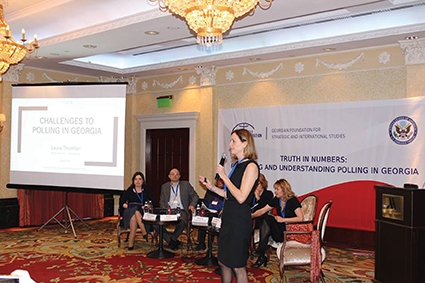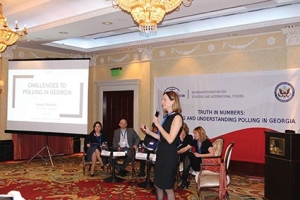Truth in Numbers: Reframing and Understanding Polling in Georgia
The Georgian Foundation for Strategic and International Studies (GFSIS), with the support of the US Embassy in Tbilisi, hosted a conference on understanding polling in Georgia.
The event aimed to engage representatives of international and local research organizations, political parties, media and civil society in a healthy discussion about the importance and necessity of sociological research.
The organizers clearly articulated that the attitude toward internationally recognized, unbiased sociological research is still ambiguous in Georgia. GFSIS claims the existing polarization or radical confrontation within the political elite for years has automatically delegitimized polls and enhanced distrust among the Georgian public.
Presentations at the event mainly concerned polling methodology, reliability and necessity in the light of the upcoming the 2016 parliamentary elections in Georgia. The conference speakers said that the planning of realistic and effective electoral campaigns by the core political players, as well as creating adequate expectations among the public, largely depends on changing the existing attitudes and distrust toward sociological research.
A keynote speaker, Kathleen Frankovic, an election and polling consultant for CBS News and other research organizations and one of the world’s leading experts in public opinion polling, shared her experience from the US elections. Frankovic stated that the significance of polling data is not only necessary for the formulation of electoral strategy and platform, but also enables the public to make individual and more informed decisions while voting.
The key players in sociological research in Georgia, the National Democratic Institute (NDI), International Republican Institute (IRI), and the Caucasus Research Resource Center (CRRC), were present at the conference. Laura Thornton, Resident Director of NDI Georgia office, in her presentation explained her organization’s research methodology. She stated that in order to build confidence among the voters, evaluating the probable outcomes of the elections is of utmost importance for civilians.
Andrea Keerbs, Resident Country Director for IRI, mainly focused on the validity of polling as greatly determining the overall credibility of a study.
Among the other speakers, CRRC President, Koba Turmanidze, described his organization’s approaches in terms of carrying out a successful study that can positively contribute to the election process. He described CRRC’s methodology, which helps his team conduct comprehensive and reliable polling.
Heads of other reputable organizations, such as Baltic Surveys/the Gallup Organization and Analysis and Consulting Team (ACT) touched upon their organizations’ polling strategies and the social landscape created in Georgia that regard polls as a less credible and unnecessary instrument in democracy, while media and civil society experts reviewed the threats of manipulation or thematic media coverage and opportunities of political growth of the electorate.
As part of the conference, political parties and civil and media representatives took to the stage to discuss the importance of the 2016 elections and the role of reasserting legitimate outcomes of elections and formation of an efficient government. The main parties, Georgian Dream (GD) and the United National Movement (UNM) were included in the panel discussions.
Commentary by GT’s Zviad Adzinbaia
The GFSIS conference came alongside the recently disclosed polling results by NDI and CRRC, which claim that GD and UNM are both supported by less than 50% of the electorate. More precisely, to the question regarding the results of the elections if held tomorrow, 15 percent of the respondents of the NDI poll said they would vote for Georgian Dream and 13 percent for United National Movement.
It seems that the majority of voters in Georgia are still wavering in their choice, disenchanted toward both their previous and current governments. Laura Thornton claims it is not surprising that citizens are completely undecided about their political leanings. “Parties and politicians have a lot of work to do over the months ahead of the elections to rebrand, rebuild trust, and talk to voters about issues that really matter to them,” she said.
What can be understood about the existing political and electoral process in Georgia, is that the country is on a democratic path, even though a true state of democracy has yet to be reached.
Zviad Adzinbaia












